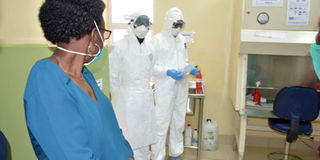New measures needed in fight against Covid-19

Minister of Health Dr Jane Ruth Aceng interacts with health workers at Masaka Regional Hospital recently
What you need to know:
- The issue: Covid-19 prevention
- Our view: It is time for government and other stakeholders to come up with new and improved intervention campaigns to keep the population vigilant.
According to the Lancet Covid-19 Commission data, Uganda was the best country in Africa in terms of suppressing the Covid-19 pandemic in August.
A story in Daily Monitor of September 25, titled, “Uganda ranked best in Africa in Covid-19 fight’, states that the data reports were based on four indicators of the pandemic, which include number of newly confirmed cases per million population per day averaged over the 31 days of August, the mortality rate measured as the deaths per million day averaged over the same period, the number of Covid-19 tests done in August relative to the number of new cases in August, which functions as a proxy measure for the scale of testing, and the average effective reproduction rate which is the effective reproduction number averaged over the month, indicating whether the epidemic was rising or falling.
The Lancet Commission, which was set up to assist governments, civil society and UN institutions in responding effectively to the Covid-19 pandemic, points out medical populism as one of the reasons why some countries have failed to suppress the pandemic.
They explain medical populism as a style of political leadership where leaders downplay the impacts of the pandemic or simplify it.
Obviously, our government cannot be accused of this.
In fact, it has scored well on this front by going all out to emphasise the graveness of the coronavirus.
This aggressiveness was seen in the numerous presidential and Ministry of Health directives made as a way of preventing transmission of the virus.
And for that, government must be commended. However, the struggle continues.
The virus is still here, deaths are still being reported and yet some preventive directives such as total lockdown on the business, school and transport sectors are no longer feasible.
Churches and mosques have joined the list of institutions that have been allowed to resume operations, albeit with very uncomfortable standard operating procedures.
The question is, as we continue opening up the country and strive towards economic recovery, shall we still be able to maintain an impressive level of suppression?
There is a tendency for communities after sometime to normalise diseases and throw caution to the wind. This is where government must focus.
Simply telling people to wash hands, wear masks, sanitise and that their lives are in their hands cannot suffice anymore as the population is weary and less attentive.
It is prudent for all stakeholders to return to the table to repackage the message of prevention, safety and suppression in a way that retain effectiveness at this point in the struggle against Covid-19.




